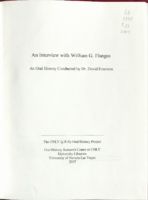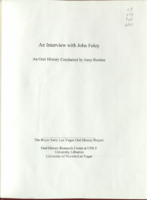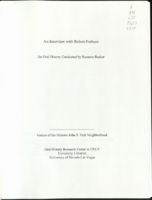Search the Special Collections and Archives Portal
Search Results

Transcript of interview with Charles Nur Fernald by Claytee D. White, May 31, 2014
Date
Archival Collection
Description
Text

Transcript of interview with William G. Flangas by Dr. David Emerson, September 27, 2006
Date
Archival Collection
Description
Text

Transcript of interview with John Foley by Irene Rostine, May 11, 2011
Date
Archival Collection
Description
Text

Transcript of interview with Lilly Fong by Annie Yuk-Siu Shum, February 29, 1980
Date
Archival Collection
Description
Text

Transcript of interview with Robert Forbuss by Suzanne Becker, February 12, 2009
Date
Archival Collection
Description
In 1944, Robert Forbuss' mother bought a home in a new tract development called Huntridge, adjacent to the John S. Park Neighborhood. She was a single woman who had managed to put together the down payment from her earnings as a cocktail waitress. A couple years later John S. Park Elementary School was built nearby. Through any ups and downs, Marjorie Forbuss refused to live anywhere else for the rest of life, even when Robert encouraged her to move. For this interview, Robert intersperse Las Vegas history while sharing childhood memories of the neighborhood. He graduated from Bishop Gorman High School, the private Catholic prep school, in the mid-1960s. A few years later, Robert returned there as a teacher from 1973 - 1981, teaching kids with familiar last names in the neighborhood he had grown up in. During that time he lived in the John S. Park Neighborhood. He details the charm of the neighborhood, cruising the Downtown area, shopping on Fremont Street and much more. When Robert left teaching, he became the general manger of Mercy Ambulance and Medical Supply, which he ultimately owned until about 2003. During this time, he was a successful business leader and an active community member.
Text

Transcript of interview with Lyla Joy Ford by Anne Cope, March 12, 1975
Date
Archival Collection
Description
Text

Transcript of interview with Carol Forsythe by Sam Copeland, March 2, 1977
Date
Archival Collection
Description
Text

Transcript of interview with Norman Forsythe by Bill Cunningham, March 4, 1978
Date
Archival Collection
Description
Text

Transcript of interview with Norman Forsythe by Steve Flint, March 19, 1981
Date
Archival Collection
Description
Text

Transcript of interview with Robert Foster by Kelley Tuchman, March 2, 1978
Date
Archival Collection
Description
Text
